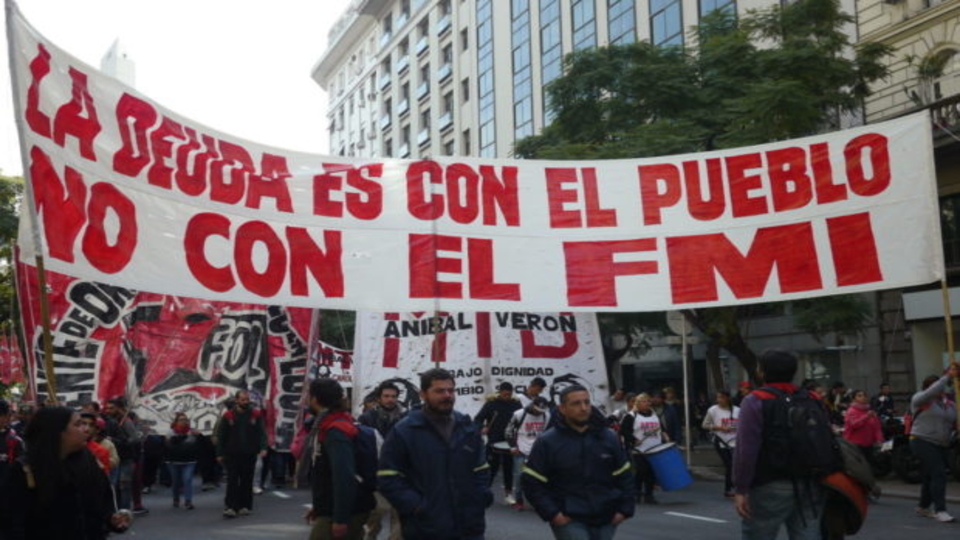On August 15, under the banner of “the debt is with the people, not with the IMF”, more than 50,000 Argentinians took to the streets across the country demanding an end to President Maurico Macri’s austerity measures. The demonstrations were also carried out to reject the further devaluation of the Argentine peso which fell from 45 pesos to the dollar to 60 pesos to the dollar last Monday.
In the city of Buenos Aires, a people’s pot [community canteen] was organized in the morning at the Obelisk to serve food to thousands of needy people suffering from poverty, hunger and homelessness. Later during the day, thousands marched from the Obelisk to Plaza de Mayo to draw attention to how the neoliberal economic policies of the right-wing government of the Cambiemos alliance have aggravated the living conditions of the most vulnerable sectors of the society.
The mobilization saw the participation of a number of social movements and organizations, such as the Front of Organizations in Struggle (FOL), the Popular Front Dario Santillan, Frente Patria Grande, the Free Organizations of the People (OLP), Barrio de Pie, Polo Obrero, Movimiento Teresa Rodríguez, Workers’ Socialist Movement (MST), Federation of Grassroots Organizations (FOB), MTD Anibal Veron, Movement for the Unity of Latin America and Social Change (MULCS), May 29 Movement, December 19 Movement, among others.
On August 11, primary elections were held in Argentina, in which left-wing candidate Alberto Fernández emerged as the winner. The next day, the US dollar rose by 30%, which led to an increase in the price of basic food products, adding to the misery of the working class.
The protesting social organizations have several demands which they believe will alleviate the situation of the most vulnerable sectors in this extreme social and economic crisis. They include a 50% increase in the minimum and vital salary, the urgent implementation of the Food Emergency Law and the extension of the Social Emergency, cessation of the suspensions of the labor programs, new job opportunities, better retirement and pension plans, better public healthcare and education services, land and decent housing for all.
According to a recent report, “The State of Food and Nutrition Security in the World 2019”, released by the Food and Agriculture Organization of the United Nations (FAO), the United Nations Children’s Fund (UNICEF), the World Health Organization (WHO), the World Food Program (WFP) and the International Fund for Agricultural Development (IFAD), the number of people suffering from “moderate or severe food insecurity” in Argentina increased from 8.3 million between 2014 and 2016 to 14.2 million between 2016 and 2018.
In addition, according to a report prepared by a group of Argentine social organizations on a census conducted in the month of April on the situation of homelessness in Buenos Aires, the number of people living on the streets has increased by over 23% in the last two years. The report highlights that there are about 7,251 people are living on the streets and out of these 7,251 people, over 1,600 people are living on the streets for the first time.
Argentina is experiencing one of the worst recessions in its history. The social and economic condition of the country is continuously deteriorating. Increasing unemployment, poverty, homelessness, food insecurity and inflation have pushed the majority of the Argentine working class to the extent where they are everyday struggling to make ends meet.





